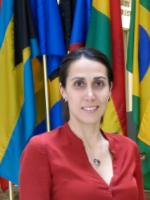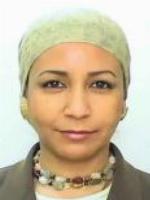

International Leaders Talk about New Learning Landscapes |
Listen and learn : Panel
Dr. Elena Arias Ortiz Dr. Helen Crompton Safaa El Tayeb El-Kogali Leandro Folgar Quenita Walrond-Lewis
Panel Discussion
Please provide a brief (6 sentences max) overview of your region and the role of technology in learning.
What strategies did educators use in your area as they navigated emergency remote education during the pandemic? Do you see any of these enduring beyond the pandemic?
(Focusing on learners) What is the role of technology in learning?
What is the role of teachers in the learning environment?
What does great learning design and technology look like?
How can technology be used to empower students?
Q&A - 10 min
| Audience: | Coaches, Principals/head teachers, Teachers |
| Skill level: | Beginner |
| Attendee devices: | Devices not needed |
| Topic: | Equity and inclusion |
| Grade level: | PK-12 |
| Subject area: | Career and technical education, World languages |
| ISTE Standards: | For Education Leaders: Equity and Citizenship Advocate
Leader
|
Panelists will describe the conditions, actions, achievements, and lessons learned from successful educational systems in the effective integration of digital technologies, during and post COVID-19, that illustrate good practices worldwide. Participants will be inspired by how international education leaders tackle educational or infrastructure challenges and the models employed.
Panel Introduction - 5 min
Moderator introduces panelists - 5 min
Panel Discussion - 40 min
Please provide a brief (6 sentences max) overview of your region and the role of technology in learning.
(We have seen a great shift in learning due to the Pandemic with 94% of students in disrupted globally and 99% of those in low and middle-income countries.) What strategies did educators use in your area as they navigated emergency remote education during the pandemic? Do you see any of these enduring beyond the pandemic?
(Focusing on learners) What is the role of technology in learning?
What is the role of teachers in the learning environment?
What does great learning design and technology look like?
How can technology be used to empower students?
Q&A - 10 min
https://thedocs.worldbank.org/en/doc/764111606876730284-0090022020/original/TheFutureOfLearningdic12.pdf
https://link.springer.com/book/10.1007%2F978-3-030-81500-4#toc
https://cdn.hundred.org/uploads/report/file/102/HundrED_Spotlight_21CenturySkills_EN.pdf
https://my.iste.org/s/store?_ga=2.247720834.440790691.1632150078-65149132.1623175578#/store/browse/detail/a1w1U000004LpjdQAC
https://blogs.iadb.org/educacion/en/education2030/
https://publications.iadb.org/en/how-do-disruptive-innovators-prepare-todays-students-be-tomorrows-workforce-deep-learning
https://publications.iadb.org/en/what-technology-can-and-cant-do-for-education-a-comparison-of-5-stories-of-success

Elena Arias Ortiz is a Senior Education Specialist. She joined the Inter-American Development Bank (IDB) in 2011 as part of the Young Professional Program. Before joining the IDB, she previously worked as a consultant for the World Bank, UNDP, and the European Commission. Elena holds a Master Degree in Economic Analysis and a Ph.D. in Economics, both from the Université libre de Bruxelles (ULB). Her research focuses mainly on the development of skills and the transition of student to higher education and the workplace and the use of digital tools to improve learning. Her publication record includes international peer-reviewed journals.

Associate Professor of Instructional Technology ISTE Faculty

Safaa El Tayeb El-Kogali is the Manager for East and Southern Africa in the Education Global Practice at the World Bank. She manages a $5 billion portfolio of education projects covering 11 countries. She is a leading international development expert with more than 25 years of experience in strategic leadership, policy advice, program management, and research covering numerous countries across 3 continents. Her publications focus mainly on economics, education, labor markets, poverty, youth, and gender. She holds an MPhil with Honors in Development Studies from the University of Sussex, UK and BA in Economics from the University of Pennsylvania, USA.

Leandro Folgar is the President of CEIBAL, the education technology, and innovation agency in Uruguay. From there, he leads the Edtech national strategy facing significant challenges during the COVID-19 crisis. He has a degree in Education (Catholic University of Uruguay, UCU) and a master's degree in Technology, Innovation, and Education from Harvard University. A Fulbright alumnus, entrepreneur, and consultant for the corporate sector, he started his career in education as a teacher and accumulated 13 years of experience in different school roles. He is passionate about the evolution of education and its influence on the future of our global society.

Quenita Walrond-Lewis is the Director of the National Centre for Educational Resource Development (NCERD), Guyana’s in-service teacher CPD; and innovations in education hub. She has worked with the Ministry of Education for the past nine years to action positive change and development across the Nursery, Primary, and Secondary levels. She has operated to build collaborative working relationships with education stakeholders nationally, regionally, and internationally. Quenita, an alumna from the University of Toronto, holds her MA degree in Child Study and Education. She endeavours daily to be the change she wishes to see in the world!
Chromebooks and Google Workspace Productivity Apps for Students With Disabilities
Fireside Chat With the ISTE Board: Recover, Reconnect and Reimagine Professional Learning
What We Don't Know: Trends in Education